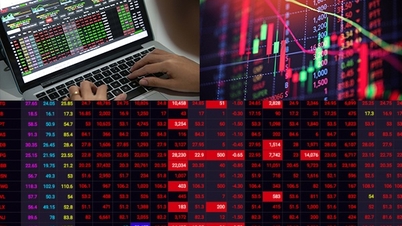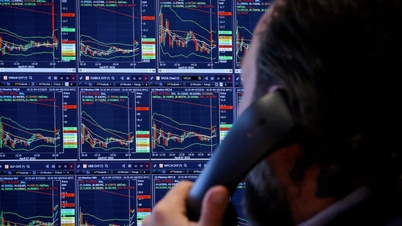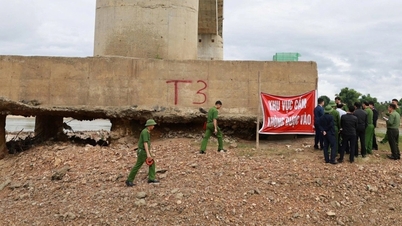War is not the only factor affecting the stock market.
Military tensions between Israel and Iran are escalating. This morning (June 17), Israel launched a massive airstrike on Iran and US President Donald Trump convened an emergency security meeting.
Mr. Nguyen Viet Duc - Digital Business Director of VPBank Securities Joint Stock Company (VPBankS) - said that according to past statistics, geopolitical events do not affect the stock market too much. With the geopolitical tensions of the past 50 years, if they only stop at the level of conflict, the impact on the stock market will only last 1-2 sessions.
If the conflict escalates but is still confined to one region, Mr. Duc believes that the level of influence will not be too great, only in oil prices, and will not have too great an impact on the whole world .
Other, more serious cases, according to VPBankS representative, are wars involving the US. In that case, the market can correct for a long time, lasting up to 3 months, such as in 2001 after the attack on the twin towers, or Iraq in 1992. These wars cause the market to correct about 10-11% and it takes 70 days to form a bottom.
According to Mr. Duc, the world market is thinking that the conflict between Israel and Iran is confined to the Middle East region, only affects oil prices and the US will not participate in the war. Therefore, the impact of this war on the world market is also only focused on the energy sector.
Oil prices are currently above $70 a barrel, lower than the 2024 average. As long as oil prices remain in the $70-80 a barrel range, the impact of this conflict is not significant.
According to the representative of the above securities company, the periods when the stock market declines the most are often not related to war, but to macro factors such as 2008 (debt crisis) in the US or 2022 (bond crisis) in Vietnam.
Only macro factors, asset bubbles, and economic factors can cause the market to fall sharply, while war is just an additional factor that can coincide with macro fluctuations and has little direct impact on the stock market.

The Middle East war could impact the energy industry (Illustration photo: ChatGPT).
Sharing the same view, Agriseco Securities believes that the fear of risk will cause direct and indirect investment capital to withdraw from financial markets in/near areas directly affected by war (Middle East region).
Global investment flows are also expected to experience many fluctuations as concerns about escalating geopolitical risks make investors more cautious with risky assets.
In the scenario of continued conflict causing disruption to the global supply chain, rising energy prices causing inflation, the process of lowering interest rates by major central banks (such as the Fed, ECB, etc.) may also be slowed down. Negative reactions from the world stock market may indirectly affect the Vietnamese stock market.
Like VPBankS, Agriseco Securities' past statistics show that some geopolitical tensions can create short-term impacts, usually concentrated in the sessions immediately after the event occurs. In most cases, both Dow Jones and VN-Index are not affected much and quickly recover after 10-20 sessions.
Oil and gas stocks and general market forecast
From the end of last week to the beginning of this week, oil and gas stocks have exploded in trading. Some codes have even hit their ceiling prices for two consecutive sessions.
Explaining the development, Mr. Duc said that the increase in oil and gas stocks was due to the time. About a week before the war broke out, VPBanks released a report on the oil and gas industry, with the investment story being that the oil and gas industry had many plans, low stock valuations, and very good cash flow of companies.
Agriseco Securities predicts that the stock market may record a short-term decline, but usually recovers afterward. In the short term, concerns about the possibility of an escalation of the conflict may put pressure on the financial market, which will soon return to an upward trend.
This implies that the initial decline will be an opportunity for medium- and long-term investors to buy stocks with good fundamentals and expectations of growing business results.
Vietnam's stock market will not be much affected by the above event because import and export activities to the Middle East are quite limited and there are almost no significant direct investment links with Israel and Iran.
In addition, in the context of increasing geopolitical instability, international investors are looking for stability to diversify their supply chains away from high-risk areas, Vietnam can emerge as a relatively safe destination thanks to its stable political environment.
Source: https://dantri.com.vn/kinh-doanh/chien-su-trung-dong-anh-huong-ra-sao-toi-thi-truong-chung-khoan-viet-20250617111600715.htm







![[Photo] Cutting hills to make way for people to travel on route 14E that suffered landslides](https://vphoto.vietnam.vn/thumb/1200x675/vietnam/resource/IMAGE/2025/11/08/1762599969318_ndo_br_thiet-ke-chua-co-ten-2025-11-08t154639923-png.webp)
























![[Photo] "Ship graveyard" on Xuan Dai Bay](https://vphoto.vietnam.vn/thumb/1200x675/vietnam/resource/IMAGE/2025/11/08/1762577162805_ndo_br_tb5-jpg.webp)








![[Video] Hue Monuments reopen to welcome visitors](https://vphoto.vietnam.vn/thumb/402x226/vietnam/resource/IMAGE/2025/11/05/1762301089171_dung01-05-43-09still013-jpg.webp)
































































Comment (0)